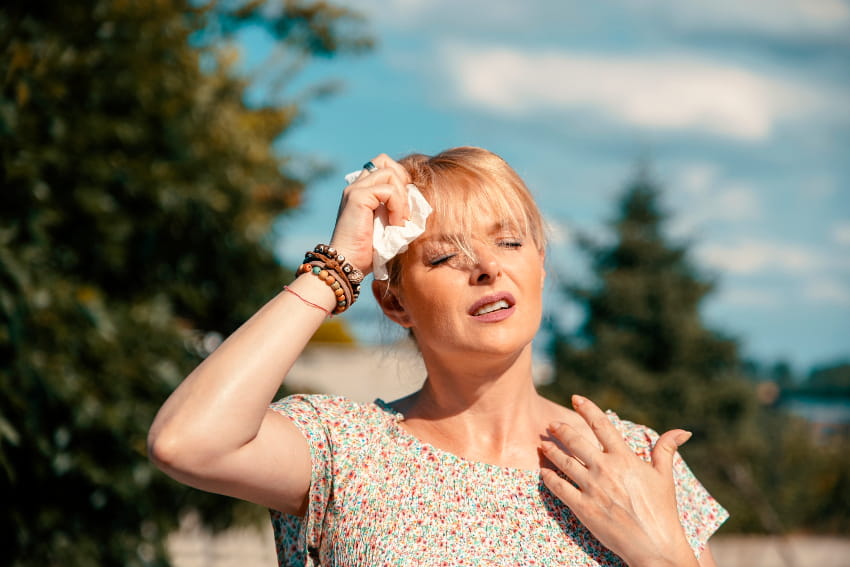7 ways to keep your hot flashes under control

A sudden warmth spreads to your face, neck and chest. Your skin starts to redden. Your heartbeat quickens. You sweat. These are the telltale signs of what many women experience due to menopause: a hot flash.
"Hot flashes are common during this phase in a woman's life, when menstrual periods begin to change and eventually stop. While hot flashes can be mild and quick, some women experience intense hot flashes that last up to five minutes and make it hard to go about their daily routine," says Patricia Ischiropoulos, MD, a gynecology specialist at Main Line HealthCare OB/GYN.
Nighttime hot flashes (called night sweats) can also impact sleep by waking you up throughout the night.
The good news is that there are ways to find relief from hot flashes. Some are simple changes to your daily routine, and others require a visit to your health care provider. Depending on how severe your hot flashes are, you may need to try a few approaches.
1. Wear appropriate clothing
If you've been experiencing hot flashes, you can prepare for the wave of heat by wearing loose clothing to keep you cool. You can also layer your clothing, allowing you to remove items to cool your body.
While the world of fashion has recently embraced hot flash-friendly clothing, you don't need to break the bank on specialized clothing. Instead, find similar clothing that's also breathable, like linen or nylon.
2. Carry a portable fan
Just like you might carry a portable fan on a hot summer day, you can do the same when you're dealing with hot flashes. When an episode begins, take out your fan and feel that sweet relief of air on your face, neck and chest.
Don't want to invest in a portable fan? No problem. Keep a thick piece of paper on hand and fold it up accordion style for a similar effect.
3. Avoid common hot flash triggers
While being prepared for hot flashes is important, it's ideal to avoid them in the first place. You can help do this by avoiding triggers that can cause a hot flash, such as:
- Alcohol
- Spicy foods
- Caffeine
- Tight clothing
- Hot weather
- Smoking
Stress is also a common cause of hot flashes. Keeping stress at bay is the goal, but that can be tough. Instead, focus on ways you can manage stress in healthy ways, like mindful meditation.
4. Maintain a healthy weight
While anyone can experience intense hot flashes, women who are overweight or obese are more susceptible to frequent and severe ones.
It's always important to maintain a healthy weight, but it can also have the benefit of easing hot flashes. Focus on eating a nutritious diet full of fresh fruits, vegetables, whole grains and low-fat milk products. Be sure to get regular exercise, too (but avoid exercising in hot weather, which can trigger a hot flash).
5. Prepare for night sweats
Hot flashes during the night — also called night sweats — are a common experience for women going through menopause. Fortunately, there are ways to prevent night sweats from keeping you up all night, including:
- Adjusting your bedroom temperature to be on the cooler side
- Drinking small amounts of cold water before you go to bed
- Using layers for your bedding so you can adjust throughout the night
- Turning on a fan
6. Use hormone replacement therapy (HRT)
"As you go through menopause, your ovaries become less effective in their job of producing hormones like estrogen and progesterone. This drop in hormones is the most likely cause of menopause symptoms like hot flashes," says Dr. Ischiropoulos.
To combat this, your health care provider may suggest hormone replacement therapy, which increases your hormone levels. This can ease hot flashes as well as other symptoms of menopause, like vaginal dryness and difficulty sleeping.
HRT can come with risks, such as stroke, heart attack, blood clots, gallbladder disease, breast cancer and dementia. However, these risks depend on your age, health history and whether you've had your uterus removed (called a hysterectomy). Only you and your health care provider can decide if and what kind of HRT is right for you.
7. Take non-hormonal medications
If lifestyle adjustments aren't enough, you might benefit from non-hormonal medications. Nonhormonal options are especially helpful if you're concerned about the risks of or can't use hormone replacement therapy due to specific health reasons, such as having a history or risk of heart attack, stroke or liver disease.
Medications called selective serotonin reuptake inhibitors (SSRIs), which are a type of antidepressants, are sometimes used to reduce the intensity and frequency of hot flashes. For instance, a medication called paroxetine has been approved by the US Food and Drug Administration to treat hot flashes.
Working with your health care provider to combat hot flashes
Hot flashes are one of the most common symptoms of menopause, but that doesn't mean you have to live with them. Instead of suffering through the heat, talk to your health care provider about what options you have to treat them, either through lifestyle adjustments or medication. Together, you can work toward a cooler and more comfortable future.
Next steps:
Make an appointment with Patricia Ischiropoulos, MD
Learn more about OB/GYN care at Main Line Health
Coping with your menopause symptoms
 Content you want, delivered to your inbox
Content you want, delivered to your inbox
Want to get the latest health and wellness articles delivered right to your inbox?
Subscribe to the Well Ahead Newsletter.
